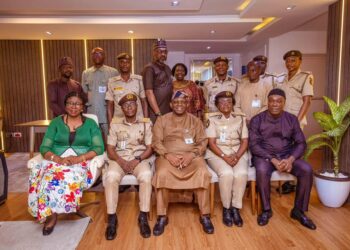Prior to the merger of the then-Joint Maritime Labour Industrial Council (JOMALIC) with the then- National Maritime Authourity (NMA), there had been so much talk about Maritime Labour Convention 2006.
Since the 2007 merger, every responsibility for sea farers welfare has been domiciled in NIMASA.
Prior to the merger of the then-Joint Maritime Labour Industrial Council (JOMALIC) with the then- National Maritime Authourity (NMA), there had been so much talk about Maritime Labour Convention 2006.
Since the 2007 merger, every responsibility for sea farers welfare has been domiciled in NIMASA.
Irrespective of their current rating within the nation’s maritime sector, the Nigerian seafarers are arguably an important stakeholder. One can hardly forget how hot and respectable it was to be a seafarer up till the mid- 1990s; that was before the liquidation of the Nigerian National Shipping Line (NNSL).
The average age of the youngest master mariner and marine engineer in the country today is about 55 years, while there are thousands of lower cadre sea farers, few of whom are gainfully employed.
A lot of people have blamed the current travail of the Nigerian seafarer on government and by extension, NIMASA, which is the implementing agency for seafarer welfare. Without mincing words, NIMASA has not done well enough to boost the marketability of emerging seafarers, this it would have done by ensuring that the Maritime Academy of Nigeria in Orin Akwa Ibom state is well funded, but rather than do this, it is at present funding the creation of maritime institutes in universities and also sending young Nigerians to foreign maritime academies for training in nautical sciences and marine engineering.
Last week, the International labour Organisation (ILO) received the 30th ratification of the Maritime Labour Convention, 2006 (MLC, 2006), fulfilling the last condition for the first global standard that spans continents and oceans to go into effect in a year’s time.
And just like the ILO Director General Juan Somavia had said, the landmark is indeed good news for the world’s seafarers. There are about 1.2 million seafarers in the world, and good enough, Nigerian seafarers make up a significant number of the lot.
It is instructive that the MLC 2006 is poised to ensure that every seafarer has the right to: safe and secure workplace that complies with safety standards, fair terms of employment, decent working and living conditions on board ship and health protection, medical care, welfare measures as well as other forms of social protection.
In specific, the MLC Convention covers conditions of employment, hours of work and rest, accommodation, recreational facilities, food and catering, health protection, medical care, welfare and social security protection.
In addition, parties to the treaty must ensure that ships flying their flag meet the ‘decent work’ requirements set out in the Convention, and certify that those ships comply with the requirements relating to labour conditions.
When it comes into effect next year, the MLC, 2006 will replace 37 existing ILO maritime Conventions and related Recommendations adopted since 1920.
Instructively also Nigeria’s name is missing on the list of countries that have ratified the all-important convention. They are: Liberia, Marshall Islands, Bahamas, Panama, Norway, Bosnia and Herzegovina, Spain, Croatia, Bulgaria, Canada, Saint Vincent and the Grenadines, Switzerland, Benin, Singapore, Denmark, Antigua and Barbuda, Latvia, Luxembourg, Kiribati, Netherlands, Australia, St Kitts and Nevis, Tuvalu, Togo, Poland, Palau, Sweden, Cyprus, Russian Federation, Philippines.
While not blaming NIMASA entirely for the various shortcomings, one can hardly exonerate the agency from the failure to get the National Assembly to pay attention to the convention.
We equally think that the fact that Nigeria does not attach attention to the MLC 2006 can only mean that it is indeed not a maritime nation. A look at the names of countries that have ratified will it will further reveal the fact that they are indeed owners of ships and groomers of seafarers
Nigeria no longer parade world-class seafarers, she no longer owns ships.
But even if we no longer own ships, the abundance of budding and qualifying seafarers should propel government to guarantee safety and decent work condition for them
If the IMO is excited about the coming into force of the MLC2006 in about 12 months, then Nigeria should also attach importance to it. We think that NIMAS should do all it can to lobby the National Assembly to ratify it, and then lobby further for its domestication
As much as we have nothing against training Nigerians abroad, we urge the agency to look beyond the immediate and ensure a good future for those it is currently training. The MLC 2006 if them
















Discussion about this post